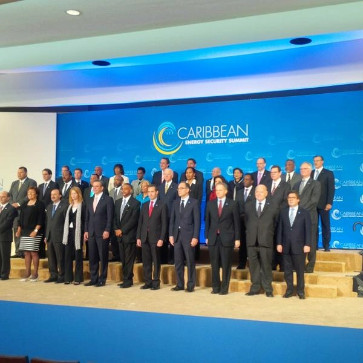 Heads of delegation to the Caribbean Energy Summit, via the State Department
Heads of delegation to the Caribbean Energy Summit, via the State Department
White House Details Caribbean Energy Approach
The islands of the Caribbean are threatened by their dependence on imported energy. Venezuela, which has dominated the control of energy in the region, is suffering as a result of low oil prices. This has created a vacuum in the region for who will provide energy, and has created a new opportunity for the U.S. The President has just returned from his trip to the Caribbean for the summit, and the White House has released its U.S.-CARICOM Summit fact sheet outlining proposals for energy cooperation between the U.S. and its neighbors.
The fact sheet outlines the U.S.’ approach to financing clean energy projects in the region, with a focus on catalyzing investment from other sources. The U.S. will also be cooperating with clean energy technology collaboration, and assisting Caribbean countries in a transition towards clean energy.
This approach to addressing the energy situation in the Caribbean is consistent with ASP’s Andrew Holland’s comments on energy security for the Caribbean, with the U.S. stepping in to fill the vacant shoes of Venezuela and also to create a more resilient energy infrastructure in the region. The U.S. has taken its first step to becoming the new energy powerhouse of the Caribbean, and this will offer better opportunities for the U.S. to influence regional politics, as well as stop trouble before it starts in our own backyard.
While stepping into this role may seem like a tall order, the U.S. can do this with minimal costs. This is because the U.S. has the ability to act as a “coordinator, not a funder” on the U.S.’ strategic approach to Caribbean energy security. The U.S. needs to help Caribbean nations develop energy dependence through green energy, and also to be able to fulfill the interim demand for fossil fuels—something which the U.S.’ shale revolution has made possible like never before.
The Caribbean summit has shown that the U.S. has an interest in fulfilling the demand for energy independence in the region, and such an approach will enhance the energy security of not only the region but of the U.S. With minimal cost but high potential gains, the U.S. will be able to become the new hub of energy in the region, enhancing its own ability to guide the politics of the region for mutually beneficial gains in climate security, energy security, and economic prosperity.
Further reading on energy in the Caribbean:
Report: Energy Security in the Caribbean
Caribbean Energy Security Conference – Panel 1 Review
Caribbean Energy Security Conference – Panel 2 Review
Caribbean Energy Security Conference – Panel 3 Review






[…] White House Details Caribbean Energy Approach Philip Rossetti The islands of the Caribbean are threatened by their dependence on imported energy. Venezuela, which has dominated the control of energy in the region, is suffering as a result of low oil prices. This has created a vacuum in the region for who will provide energy, and has created a new opportunity for the U.S. The President has just returned from his trip to the Caribbean for the summit, and the White House has released its U.S.-CARICOM Summit fact sheet outlining proposals for energy cooperation between the U.S. and its neighbors. […]